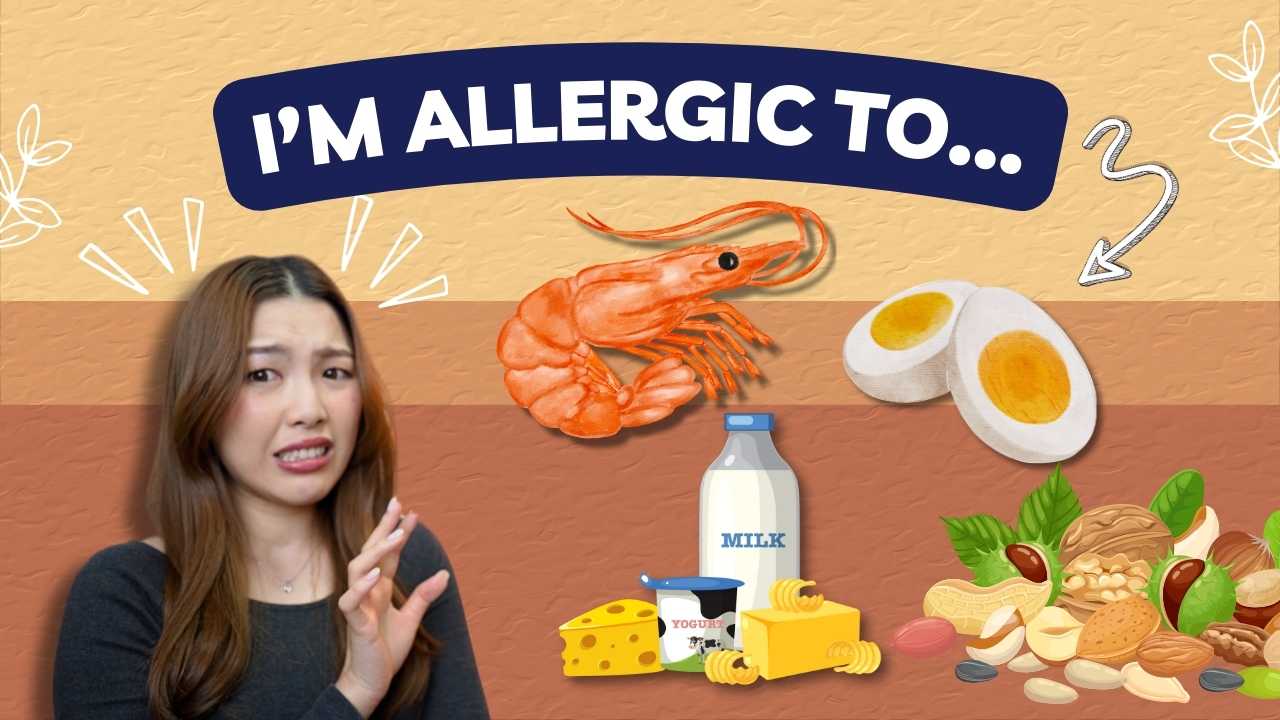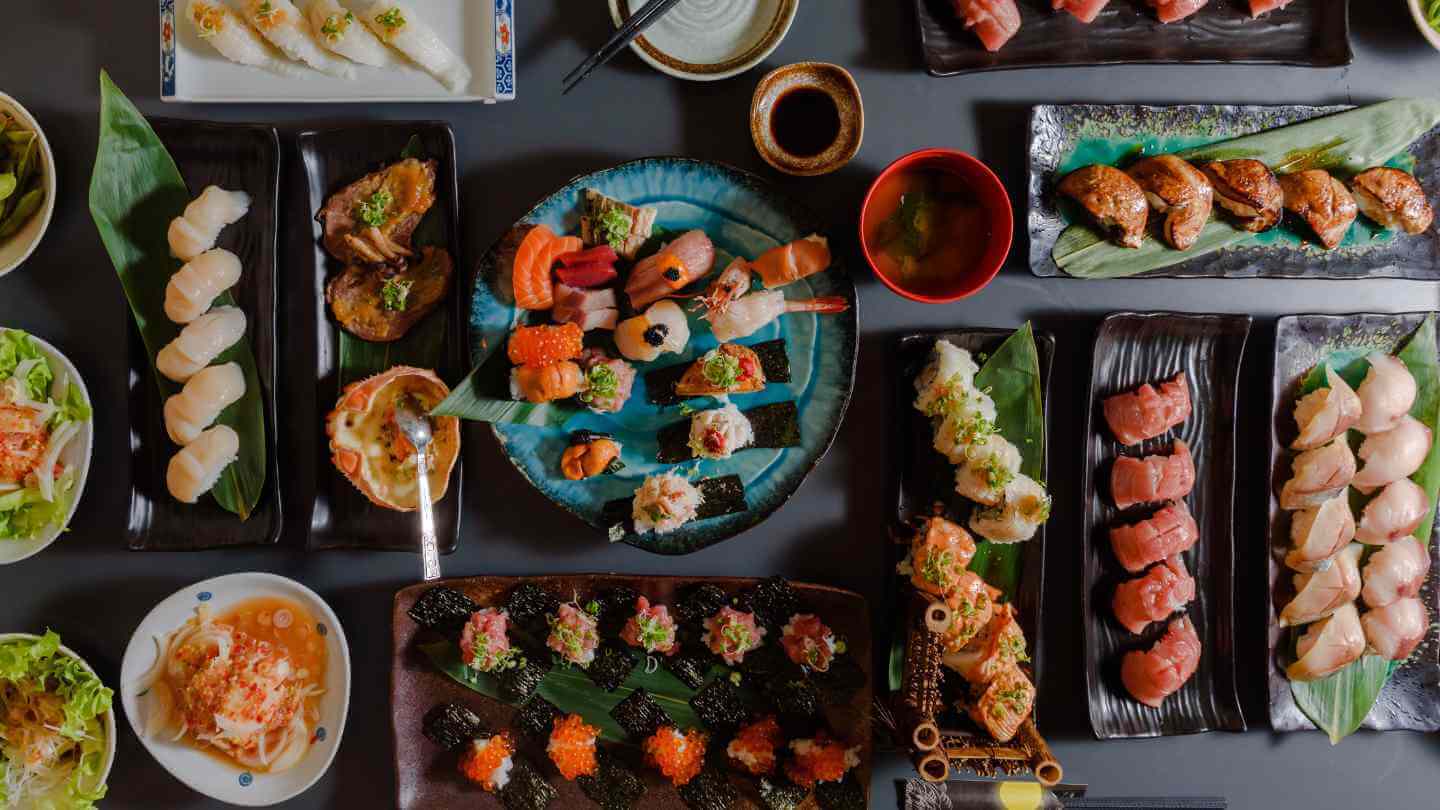
How to: Talk about food allergies in Japanese
This article will save your life (if you have allergies). Traveling in a foreign country like Japan when you have an allergy or two can be difficult, especially when you can’t speak Japanese fluently. But, don’t worry. We got your back.
In this article, I will give you a save-and-show allergy card graphic, as well as a list of phrases you can use before trying to enjoy any food you encounter in Japan.
Travel Note: for any emergencies requiring immediate medical help or an ambulance, call 119.
Table of Contents:
VIDEO LINK: Click Here
Start Here: List of Foods in Japanese with common allergic reactions
Below is a list of 28 recognized allergenic foods in Japan. Make sure to remember the name of the food item you are allergic to in Japanese since you will need them to fill in the blanks in all the phrases I will teach you below!
| shrimp | えび ebi | wheat | こむぎ(小麦)komugi |
| crab | かに kani | buckwheat | そば soba |
| dairy products | 乳製品(にゅうせいひん) nyuu seihin* | eggs | たまご(卵)tamago |
| peanuts | ピーナッツ pi-natssu | walnuts | くるみ kurumi |
| almonds | アーモンド a-mondo | abalone | あわび awabi |
| squid | いか ika | salmon roe | いくら ikura |
| oranges | オレンジ orenji | cashew nuts | カシューナッツ cashu-nattsu |
| kiwi fruits | キウイフルーツ kiui furu-tsu | beef | 牛肉 gyuniku |
| sesame | ごま goma | salmon | さけ sake |
| mackerel | さば saba | soybeans | 大豆 daizu |
| chicken | 鶏肉 toriniku | banana | バナナ banana |
| pork | 豚肉 butaniku | Matsutake mushrooms | まつたけ matsutake |
| peach | もも momo | Japanese yam | やまいも yamaimo |
| apple | りんご ringo | gelatin | ゼラチン zerachin |
*milk (cow milk) is called ぎゅうにゅう (gyunyu) in Japanese
1. “I cannot eat _______” in Japanese
Phrase #1: ナッツ、たべれないんですが… (Nattsu taberenaindesu ga…)
At first, Sayaka gives this phrase which means “I cannot eat nuts, but….”
By saying this, you are giving the server a heads up about how you are not able to eat certain foods. Since people in Japan tend to avoid being direct, they instead imply a bigger message by explaining the situation. Therefore, this phrase is used to evoke the server to inform whether a certain menu may contain the items you are allergic to.
Giving Reason to Refuse Certain Foods:
Here’s another phrase for you:
______ がたべられないです
(ga taberarenai desu)
This phrase meaning “I can’t eat” is useful, when you want to respond to a question, or give reason to refuse a certain food item.
2. “I have a ______ allergy” in Japanese
The second phrase Sayaka gives is this:
Phrase #1: ナッツアレルギーなんですが… (nattsu arerugii nandesuga…)
“I’m allergic to nuts, but…”
Likewise, this is said to give a heads up to the server.
In addition, these are some other useful phrases Japanese people use to convey the same message:
- ___アレルギーです (arerugii desu)
- 私は______アレルギーがあります。 (Watashi wa _____ arerugii ga arimasu.)
Talk about a Severe Allergy
For more serious allergies you can say:
重度の_____アレルギーです
(Jūdo no ________ arerugii desu)
which means, “I have a severe allergy for…”
3. “Does it contain ______?” in Japanese
Another useful phrase covered by Sayaka is this:
これ、_______ はいっていますか?
(kore, ______ haitte imasu ka?)
“Does this contain…?”
To explain further, you can point at a menu item while using this phrase, to check if it contains any ingredients you may have an allergy or have dietary restrictions to.
For instance, with nuts, you can say:
これ、ナッツはいっていますか。
(Kore, nattsu haitte imasu ka?)
What’s more, the word これ can be replaced with the name of the dish. Let’s see it used in a dialogue.
Talking about a Food Allergy: Sample Dialogue
Sam: すみません。(sumimasen)
Sam: 私、貝(かい)アレルギーなんですが… (watashi, kai arerugii desu.)
おこのみやきに貝はいっていますか? (okonomiyaki ni kai wa haitteimasu ka?)
Server: いえ、貝ははいっていないですよ。 (ie, kai wa haitteinai desu yo)
Sam: じゃあ、おこのみやきをください。(jaa, okonomiyaki wo kudasai)
Server: かしこまりました。(kashikomarimashita)
Click for Translation
Sam: Excuse me.
Sam: I have shellfish allergy. Does the okonomiyaki contain any shellfish?
Server: No. There’s no shellfish in it.
Sam: Then, I’ll have the okonomiyaki please.
Server: Got it.
In the dialogue, Sam, who is allergic to shellfish, checks with the server if the dish, Okonomiyaki, has any shellfish.
(Okonomiyaki can often contain lots of seafood, including shellfish and calamari)
4. “Can you make it without ______?” in Japanese
Lastly, Sayaka asks this question:
これ、ナッツぬきにできますか?(kore, nattsu nuki ni dekimasuka?)
By replacing ナッツ with a food you have an allergy to, you can ask if a menu item you want can be made without that item.
これ、_____ぬきにできますか?
Author’s note:
A popular thing to say at a handmade sushi restaurant is this phrase. Can you guess what it means? I say this a lot.
さびぬき、おねがいします (sabi nuki, onegaishimasu)
The common phrase おねがいします means please. ___ ぬき means “without X”. Does “sabi” sound like anything? Yes, wasabi.
This is a phrase Japanese people use to ask for sushi without wasabi. Why is it called “sabi”? Well, we like to shorten a lot of things, that’s why!
(Sorry if you are a wasabi lover, you won’t find this phrase useful)
5. Other dietary restrictions
Similarly, for people with dietary restrictions like gluten-free or dietary choices like vegetarian/vegan, these phrases will be useful:
グルテンフリーのメニューはありますか?
(guruten furi- no menyu wa arimasuka?)
Meaning, “Do you have a gluten-free menu?”
Replace gluten-free with the word ベジタリアン (bejitarian) or ヴィーガン (vi-gan) to check if they have a vegetarian or vegan menu. Likewise, you could also ask:
これ、グルテンフリーですか?
(kore, guruten furi- desuka?)
meaning, “Is this gluten-free?”
Food Allergy in Japanese: Mini Quiz
Quiz 1: How would you ask in Japanese if a menu item contains a specific ingredient, indicating a potential allergy or dietary restriction?
A. これ、グルテンフリーですか? (Kore, guruten furi- desuka?)
B. これ、_____ はいっていますか? (Kore, ___ haitte imasu ka?)
C. 私は______ アレルギーがあります。 (Watashi wa _____ arerugii ga arimasu.)
D. これ、_____ ぬきにできますか? (Kore, ____ nuki ni dekimasuka?)
Quiz 2: Which one is “shrimp” in Japanese?
A. かに (kani)
B. たまご (tamago)
C. えび (ebi)
D. もも (momo)
Quiz 3: What is the Japanese phrase used to convey a message to the server about not being able to eat certain foods, implying a bigger message without being direct?
A. ____、たべれないんですが… (____ taberenaindesu ga…)
B. じゃあ、_____をください。(Jaa, _____ o kudasai)
C. これ、_____ぬきにできますか? (Kore, _____ nuki ni dekimasuka?)
D. 私は______ アレルギーがあります。 (Watashi wa _____ arerugii ga arimasu.)
Quiz 4: What Japanese phrase would you use to express having a severe allergy to a specific item?
A. ____、たべれないんですが… (____ taberenaindesu ga…)
B. ____がたべれないです… (____ ga taberenaidesu)
C. 重度の_____アレルギーです (Jūdo no ________ arerugii desu)
Check: How many did you get correct? Leave your answer in the comment.
Having allergies while traveling can be an obstacle, but by learning phrases to bypass that will make your Japan trip worthwhile. If anything, your brain will be happy to be able to use these phrases like a native speaker! Yet, if you are still shy to use them, make use of our allergy info cards. Let us know if you were able to use them and drop some recommendations for Japanese food for people with dietary restrictions – many of us will appreciate them!
Ready to learn more?
Today you learned how to talk about Food Allergies in Japanese. Now you can enjoy eating out in Japan without worrying about allergy reactions or using your epipen. However, have you…
- Ever thought of learning Japanese, but have no access to classes?
- Learned Japanese, but want to speak more?
- Given up on speaking Japanese before?
- Been tired of your unmotivated classmates?
- OR are you UNMOTIVATED to study Japanese?
Then you should check out Sayaka’s Beginners Japanese lessons! With engaging weekly lessons covering task-based conversation practice, kanji, grammar for different situations, and useful phrases, you will for sure fall in love with all the fun and warmth you will experience in Sayaka’s class. Check her 101/102/103 and 104 classes out here!
Follow Sayaka on Social Media:


This is super useful!
With tons of places to eat in the touristy areas of Tokyo and Kyoto, this definitely comes in handy – especially since most of the menu is in kanji / the staff know limited English. I was in 102 when I visited Japan and several times, I had to wait to get seated because the restaurant staff searched for any employee that knew some English to assist me.
Jumpei Sensei – I don’t see melon pan on the list though! Kidding, kidding, hope you’re well! 😋
I’m glad you liked it!
ありがとう
I wish I could say so much more. My son has a severe gluten allergy and would love to take him to Japan one day. This is very helpful 🙂
Hopefully the pdf allergy communication sheet will come in handy when you and your son comes to Japan 🙂
Thank you for all of this, it’s very helpful.
Happy to help!
I am allergic to shellfish. How do I say that in Japanese?
You can say 甲殻類(こうかくるい)アレルギーです {Koukakurui arerugii desu} to say I have shelfish allergy.
Hello,
Can you please add two more items to your pdf please?
Chickpeas and Hazelnuts?
Very useful article. We are travelling next week, have lots of allergies and dietary restrictions in the group.
Wonderful website. A lot of useful information here. I am sending it to some friends ans also sharing in delicious. And certainly, thanks on your effort!
You have mentioned very interesting points! ps nice website.
As a Newbie, I am continuously exploring online for articles that can help me. Thank you
Aw, this was a really nice post. In idea I wish to put in writing like this moreover – taking time and actual effort to make an excellent article… however what can I say… I procrastinate alot and certainly not appear to get one thing done.
I wanted to thank you for this great read!! I definitely enjoying every little bit of it I have you bookmarked to check out new stuff you post…